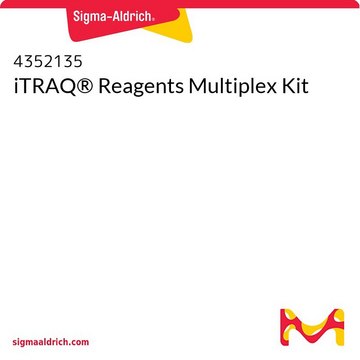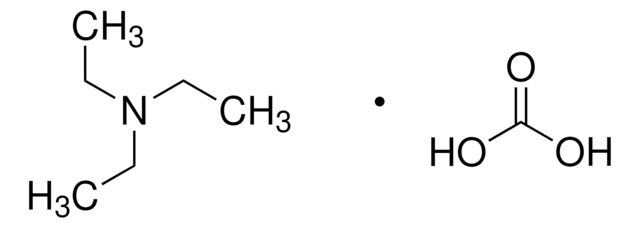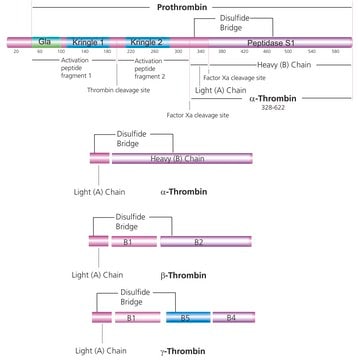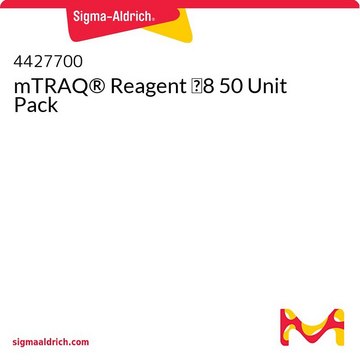4381664
iTRAQ® Reagent - Multiplex Buffer Kit
Synonim(y):
isobaric tags for relative and absolute quantitation, buffer kit
Zaloguj sięWyświetlanie cen organizacyjnych i kontraktowych
About This Item
Kod UNSPSC:
12161503
NACRES:
NA.25
Polecane produkty
Warunki transportu
dry ice
temp. przechowywania
−20°C
Opis ogólny
Contains SDS – Denaturant, TCEP Reducing Reagent, MMTS Cysteine Blocking Reagent, TEAB Buffer and Isopropanol, sufficient material for either two 8-plex Multiplex Kits, three 4-plex Kits, or four mTRAQ® 10 Assay Kits.
The iTRAQ® Reagents are a set of isobaric, multiplexed, amine-specific, stable-isotope reagents that can label all peptides in up to eight different biological samples at the same time, allowing for simultaneous identification and quantitation, both relative and absolute, while preserving important post-translational modification (PTM) information. The iTRAQ® reagents can be used to study the differential expression of proteins in perturbed systems.
Zastosowanie
iTRAQ® Reagent - Multiplex Buffer Kit has been used in the isobaric tag for relative and absolute quantitation (iTRAQ) labeling of protein samples.
Komentarz do analizy
To view the Chemistry Quick Reference Card for the iTRAQ® Reagents, please visit this Chemistry Quick Reference Card link.
Informacje prawne
MTraq is a registered trademark of AB Sciex Pte. Ltd.
iTraq is a registered trademark of AB Sciex Pte. Ltd.
Ta strona może zawierać tekst przetłumaczony maszynowo.
Hasło ostrzegawcze
Danger
Zwroty wskazujące rodzaj zagrożenia
Zwroty wskazujące środki ostrożności
Klasyfikacja zagrożeń
Eye Irrit. 2 - Flam. Liq. 2 - Skin Irrit. 2 - STOT SE 3
Organy docelowe
Central nervous system
Kod klasy składowania
3 - Flammable liquids
Temperatura zapłonu (°F)
53.6 °F - closed cup
Temperatura zapłonu (°C)
12.0 °C - closed cup
Wybierz jedną z najnowszych wersji:
Masz już ten produkt?
Dokumenty związane z niedawno zakupionymi produktami zostały zamieszczone w Bibliotece dokumentów.
Klienci oglądali również te produkty
Lynn R Zieske
Journal of experimental botany, 57(7), 1501-1508 (2006-04-01)
Proteomic research includes the characterization of protein mixtures in order to understand complex biological systems and determine relationships between proteins, their function, and protein-protein interactions. Often the goal of such research is to monitor changes of proteins in perturbed systems
Hongmei Lu et al.
Clinical proteomics, 16, 33-33 (2019-08-07)
Diabetic nephropathy is the most frequent cause of end-stage renal disease worldwide. Identification of biomarkers for diabetic nephropathy for early diagnosis may be the key to avoiding damage from this condition. Proteomic iTRAQ technology was first used to identify differentially
Nasz zespół naukowców ma doświadczenie we wszystkich obszarach badań, w tym w naukach przyrodniczych, materiałoznawstwie, syntezie chemicznej, chromatografii, analityce i wielu innych dziedzinach.
Skontaktuj się z zespołem ds. pomocy technicznej











